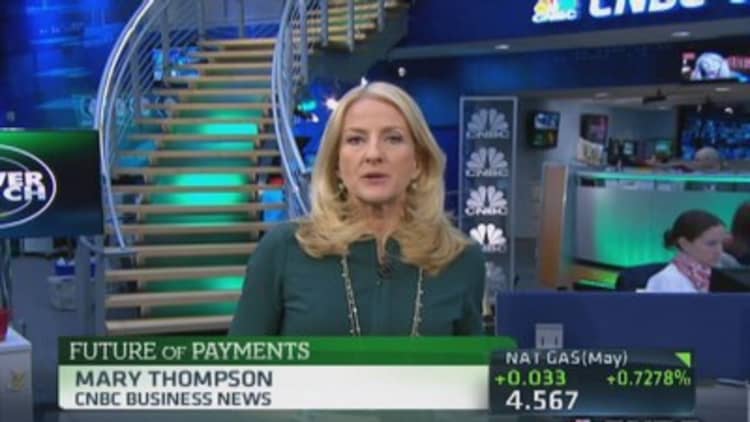For just about as long as there has been money, people have found ways to steal it. And as sure as there will be money 25 years from now—at least in some form—white-collar crooks will still be plying their trade. But new technologies could create a world where, as one former law-enforcement official warns, "the sky's the limit in terms of what fraud you can commit."
Experts say the crimes themselves never change much. From basic frauds and Ponzi schemes to complex security breaches, money laundering and tax avoidance, there are only so many ways a crook can make a buck. When CNBC launched in 1989, junk bond king Michael Milken was defending himself against securities fraud charges in a sweeping insider-trading investigation. Twenty-five years later another Wall Street insider-trading crackdown—this one focusing on hedge funds—has ensnared 79 people and counting.
Now consider a world where an inside trader can get his information not from a human source inside a company but from an outside hacker who steals the data from the company's database in the cloud. He passes the information along through a series of hopelessly encrypted, undetectable instant messages. The illicit trade is completed in nanoseconds. The profits are collected in virtual currency. And the criminals live to trade—and steal—another day.
Consider a Ponzi schemer—a next-generation Bernie Madoff. Only this one is not a real person but a front for a rogue country, which can steal your money, spend it and launder it in the blink of an eye.
Welcome to white-collar crime, 2039.
"Just use your imagination in terms of what kind of fraud you want to commit," said Thomas G.A. Brown, who helped pioneer cyber investigations in the Manhattan U.S. Attorney's Complex Frauds Unit.
Brown, now a senior managing director at FTI Consulting, said the white-collar criminal of the future will have the ability to be faster and more anonymous than ever—creating the opportunity for "almost the perfect crime."
In fact, criminals have some of those abilities today.
Read MoreDOJ official says groundwork laid for more white-collar crime enforcement
"Cybercrime is not just the wave of the future, but it's taken off already," said E. Danya Perry, another former top deputy in the Manhattan U.S. Attorney's office, now in private practice. "I don't think we've really seen all the forms it can take yet."
Cybercrime is already costing the U.S. economy as much as $120 billion a year and as much as $1 trillion globally, according to a study released in 2013 by McAfee and the Center for Strategic and International Studies. This, in a crime wave that is still relatively new.
Prosecutors got a glimpse into the future last year with the take-down of Silk Road—an underground website that authorities alleged was "the most sophisticated and extensive criminal marketplace on the Internet."
Although the focus of the Silk Road case is on the illegal drug trade, Brown of FTI Consulting said investigators found techniques that could "turbocharge financial crime going forward."
Virtual loot
Chief among the emerging techniques is the use of bitcoin, the virtual currency that's already altering the global payment system.
"Bitcoin is very difficult to regulate," Brown said.
In the Silk Road case, which Brown helped build, the federal government has seized more than $33 million worth of bitcoin from the computers of the site's alleged founder, Ross William Ulbricht. But that's just a fraction of the $1.2 billion in sales the operation is accused of generating in less than three years. And tracing much of that money is next to impossible.
"Think of each bitcoin as the equivalent of a gold bar," Brown said. There is no way of knowing where that gold bar came from, and it's easy to cash in. "You can take it and run with it."
Even if investigators can trace bitcoin to a specific account, that move does not necessarily get them to the owner. "There is no requirement that you register a bitcoin account in your true name," Brown said.
Bitcoin is not the only virtual currency. Also in 2013, a federal grand jury in New York indicted Liberty Reserve—which trafficked in the currency known as LR. Authorities seized five Internet domains and sued 35 currency-exchange sites in what Manhattan U.S. Attorney Preet Bharara described as one of the largest international money-laundering prosecutions in history.
Read MoreUS grabs $3 million worth of bitcoins in Silk Road raid
The white-collar crime implications of the virtual currency revolution are huge. For one, Brown said, the new money could make tax evasion easier than ever.
"I can engage in whatever transactions I want going forward and not pay any taxes, because no one knows what I'm doing," Brown said.
"The financial incentives are going to be so strong to be on the bad side of it," Perry said.
Just how regulators and law enforcement will push back on those incentives—and what agencies will lead the way—is still unclear.
Read MoreSEC seeks to break from its troubled past
In March the Internal Revenue Service issued its first guidance on virtual currencies such as bitcoin and LR.
"Virtual currency is treated as property for U.S. federal tax purposes," the IRS said in a March 25 notice. "A payment using virtual currency is subject to information reporting to the same extent as any other payment made in property," according to the notice.
But in a world where financial criminals can operate anonymously, how will anyone know?
Fraudsters anonymous
"Finding the people, where identities are so fuzzy—that gets tricky," said Perry. "As long as there is a place where you can exchange anonymously, this kind of thing will continue."
In the Silk Road case, prosecutors say thousands of drug dealers and more than 100,000 buyers hid their identities through the use of so-called tumblers, which scrambled their information to make the transactions anonymous.
Criminals are also already making heavy use of a technology known as Tor—originally an acronym for The Onion Router, for its many layers of complexity—to cover their Internet tracks.
Tor software, available free online, allows the user to mask his computer's IP address—its unique online signature—as well as the IP address of every server to which the computer communicates.
"Think of it like a giant pinball machine," Brown said, where the silver ball is your computer. Every time the ball hits a bumper, its identity—its IP address—changes. So does that of the bumper, making the traffic "functionally impossible" to trace.
In addition to hiding illicit transactions and underground websites, Tor allows criminals—financial and otherwise—to congregate and share information more easily than ever.
"Back in the old days, you had to know 'Joey from the block' or 'Robbie from Bensonhurst' to put together a robbery crew," Brown said.
Now, with their identities hidden by all the new technology, white-collar crooks, hackers and identity thieves can meet and share information without fear in so-called carding forums. These are more than just chat rooms for crooks. The forums allow them to trade stolen identities, software code and even money under the radar of authorities.
"A smart criminal using good operational security is nearly impossible to find," said Brown.
Playing into the hands of tomorrow's criminal, he said, are companies that are already under pressure to put more and more of their precious information online and in the cloud so their employees and customers can easily access that data—an open invitation to hackers.
"A lot of companies focus on gathering and use of the information rather than securing the information," Brown explained.
Read MoreHow identity thieves snatch billions in phony tax refunds
Fighting back
The white-collar criminal of the future may not be an individual. It may be an entire country. Brown worries about the rise of the "nation-state" in financial crime. "A lot of this is not discussed in any great detail because of the classified nature," he said.
But a widely publicized 2013 report by private security firm Mandiant, alleging China's military is hacking into U.S. companies to steal intellectual property—a charge China has denied—could be the tip of the iceberg, Brown said.
Madoff's $65 billion fraud was decidedly low-tech and took decades to carry out. And while he had a relative handful of co-conspirators, the scam relied on his unique ability to con. In the future, a rogue government could create a Madoff-like persona, or realistic brokerage to pull off an even bigger fraud at digital speeds.
Regardless, experts say greater international cooperation is a key to stopping the white-collar criminals of the future.
"We need to further break down the barriers that exist internationally," Brown said.
That could mean strengthening existing treaties, as well as making sure there are sufficient resources around the world for authorities to share information fast enough to beat criminal networks to the punch.

How will law enforcement fight the white-collar criminal of the future? Maybe by fighting fire with fire.
"Law enforcement really needs more tools," Brown said.
That could include government versions of advanced technology to flush out the bad guys. Some is already in use, including spyware and specialized surveillance tools allowing investigators to tap into a suspect's Wi-Fi, for example. But the tools are subject to restrictions as well as controversy following ongoing revelations about government surveillance.
Nonetheless, late last year the Justice Department asked the courts to ease limits on search warrants, allowing prosecutors to obtain a single warrant to search a suspect computer server no matter where it is located. Currently, they arallowed to conduct a search in the judicial district only where the warrant was issued. If a criminal enterprise has covered its tracks with the new technologies, investigators can lose precious time requesting multiple warrants, the department argued.
But some of the most effective tools to fight the financial crime waves of the future are already in law enforcement's arsenal: "Old boots-to-the-ground detective work," said Perry.
Indeed, prosecutors cracked the recent wave of virtual currency cases with the help of confidential informants and undercover agents, all of whom will still have a place 25 years from now. As the crooks get more sophisticated, experts say, one of the best ways to fight them may be to simply get back to basics.





